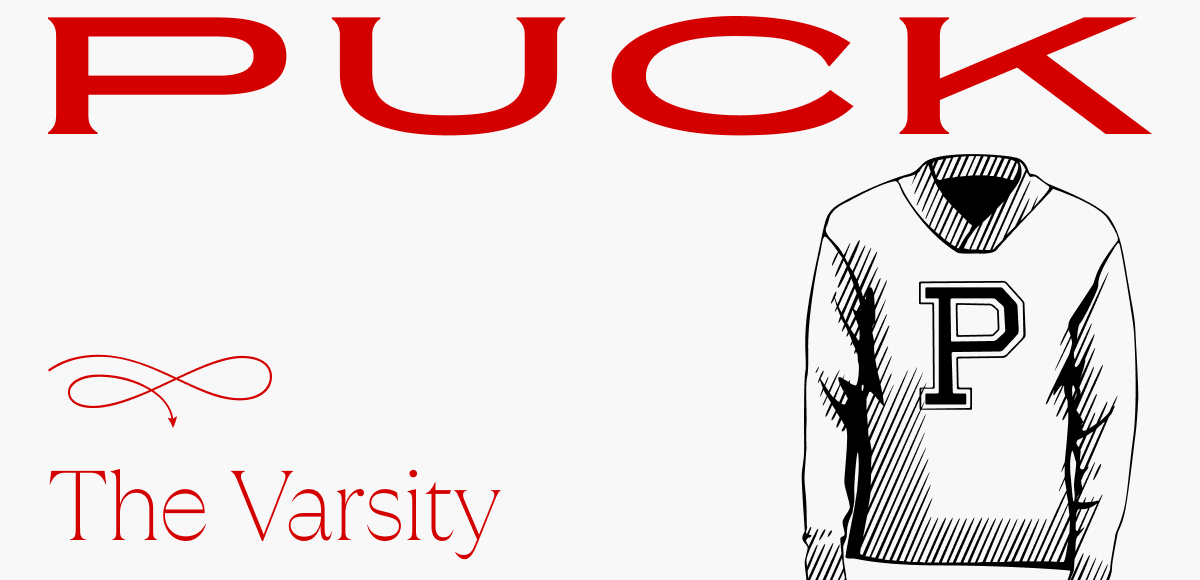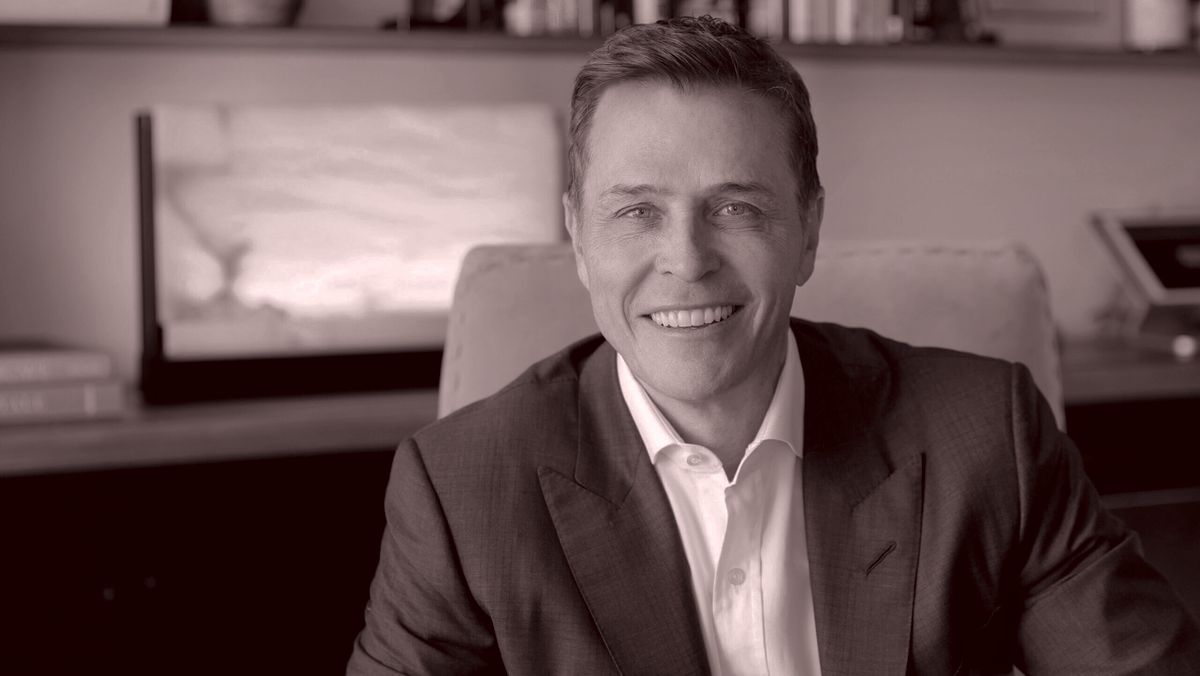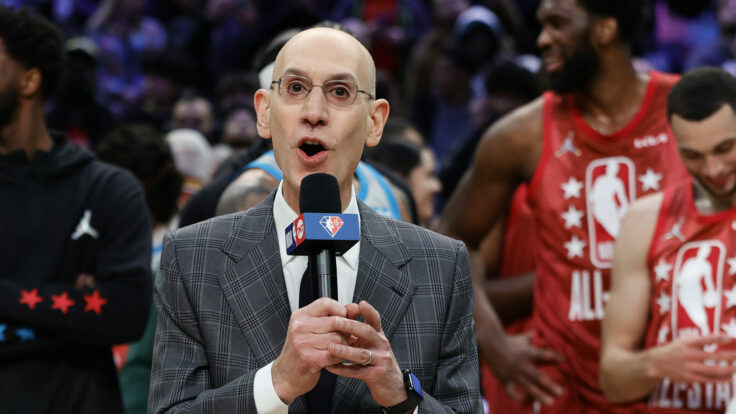Welcome back to The Varsity, my twice-weekly private email on all the
sports executives and dealmakers off the field. Much of my excitement around the Terps’ Sweet 16 game has been drained by the rumors that Kevin Willard, Maryland’s coach, is moving to Villanova next season. Still, if you call me between 7:30 and 9:30 tonight, I’m not picking up. Marchand will be on standby to take dictation.
🚨 Pod Alert!:
After 20 years as the top college football analyst for CBS Sports, Gary Danielson announced his retirement yesterday. Danielson joins The Varsity this weekend to discuss his decision. Also, make sure to download yesterday’s podcast, where Puck’s resident streaming expert Julia Alexander explains the divergent
strategies the streamers are using to pull in sports fans.
📺 By the numbers: Around 3,000 people have watched at least one minute of all 48 first- and second-round March Madness games. As Fox president of insight and analytics Mike Mulvihill posted on social media: “Congratulations to these American heroes!”
|
Player of
the Week: David Berson
|
The CBS Sports president continues to run a drama-free zone at his network—an accomplishment, given
all the distractions of the Paramount sale, the 60 Minutes lawsuit, etcetera. Just yesterday, Berson seamlessly switched out his top college football analyst, the retiring Danielson, for Charles Davis from the network’s number two NFL booth. Meanwhile, J.J. Watt is getting sprung from the studio to replace Davis in the booth. All strong moves that garnered great press yesterday, and underscored the respect CBS announcers have
for Berson.
|
Down to the
J.V.: Charlie Baker
|
The head of the NCAA has to change the timing of college basketball’s transfer portal,
which opened on Monday and has already brought in more than 1,000 players. Look, the portal is here to stay. But it’s insane to have it open in the middle of March Madness, when 16 of the country’s top teams are still playing. It’s a distraction for them and the fans, and the latest sign that the governing body of college sports has absolutely zero control over its membership.
|
|
|
A MESSAGE FROM OUR SPONSOR
|
PERFORMANCE UNLEASHED
With a distinct sporting personality, the Range Rover Sport is a peerless
performer.
EXPLORE
|
|
|
- The ongoing MLB-ESPN divorce: Sports media is based on relationships. Once rights deals are signed, mediacos and leagues spend the length of their contracts working together on everything from scheduling and production to marketing. That’s why ESPN’s public divorce from MLB remains such an outlier. Deals go sideways all the time, but you rarely see this much public rancor between two entities that have partnered for decades and, in all likelihood, will be back in business
together again soon enough.
During a media tour in advance of Opening Day, MLB commissioner Rob Manfred shed more light on why the relationship frayed. SiriusXM host Chris Russo asked Manfred whether he’d heard from anyone at ESPN before they exercised an out clause in its contract. “Eventually it got to the point that they told us what they were thinking, but we had been reading leaks for over a year before that phone call took place, and that’s
unfortunate,” said Manfred. “It did not help the conversations.”
Manfred went on to say that the league was already upset that ESPN ended Baseball Tonight back in 2017 and decreased the number of highlights on SportsCenter. When ESPN chairman Jimmy Pitaro called to say the network wanted to cut its rights fee even further, that was a bridge too far. “They stepped up for the NBA,” Manfred said. “They stepped up for football… and to come back to us and
say, We want to cut you…”
Manfred insisted that interest “has been very good” for ESPN’s package of Sunday Night Baseball, the wild card playoff games, and the Home Run Derby. That tease was confirmed by NBC Sports president Jon Miller, when he was asked about the MLB at an industry event this week. “A lot of [broadcasters] are kicking the tires on MLB opportunities,” Miller said. “We are as well. It’s no secret, but everyone else is doing the same.”
- The NBA’s European move: LeBron James’s business partner, Maverick Carter, created a stir back in January when he started advising a group of investors looking to raise $5 billion to form an international basketball league. The news conjured images of a LIV Golf–style competitor to the NBA. Ever since, it’s been relatively quiet. At least until today, at the NBA board of governors meeting in New York, when
commissioner Adam Silver outlined plans to launch an NBA-branded league in Europe as soon as next year—a move that would not only challenge Mav’s business, but also likely nuke it.
The expansion might sound reactive to Carter’s play, but this plan actually predated that announcement by about a year. Of course, Carter’s splashy and uneven rollout in January—the Bloomberg story, the bizarre coterie of investors with minimal expertise in sports—caught
the NBA off guard, and very likely pissed off a number of guys who don’t like getting pissed off, which sped things up. But the NBA has long harbored ambitions to expand internationally. This appears to be the first substantial step.
The idea, it seems, is for the NBA to explore a league with as many as 10 teams in partnership with FIBA. Sportico’s Scott Soshnick and Eben Novy-Williams
reported that the NBA would own 50 percent of each franchise, and sell the other half to sovereign wealth funds, private capital institutions, individuals, and existing European basketball clubs. The journalists noted that teams in cities like London or Paris could sell for at least $500 million, according to the proposal.
- Replay review March Madness: Rest assured, you’re not the only one frustrated by the overuse of replay in men’s college basketball. The last two minutes of a game are too often saddled with mind-numbing images of referees huddling over a tiny TV monitor. Officials stop the game for a review nearly every time the ball goes out-of-bounds. Then there’s more dead air as they debate whether to add half a second, or a full second, back on the clock. After
talking to several influential executives, I wouldn’t be surprised to see changes made by next season. Collegiate administrators and media executives alike agree that replay reviews are siphoning drama from the final minutes of close games.
One possibility is to offer a coach’s challenge system, similar to the one that exists in the NBA, which limits the number of times replays are used. Not surprisingly, coaches tend to resist that idea on the theory that it’s more important to
get the calls correct rather than overrule them. But the administrators and executives want to make sure the final moments of games are actually entertaining, and this seems like the most promising way forward. Another possibility: A centralized HQ that can quickly and efficiently complete a replay review.
- Why Netflix bought the Women’s World Cup: As Amazon and Netflix build out their advertising tiers, they’re becoming increasingly aggressive bidders
in the sports rights marketplace. But they’re approaching commercial revenue differently than traditional linear TV. “You used to be able to say that a network like ESPN commands X amount of viewers from 8 a.m. to 8 p.m.,” my partner Julia Alexander noted on the Varsity podcast yesterday. But Netflix and other streamers that are pushing into advertising are more focused on a title rather than a time slot. “The Women’s World Cup really gives Netflix the ability
to go out and say, We’re going to command a really high-level title advertiser as well as a supportive advertiser,” Julia explained. Also, as she pointed out, streaming doesn’t lend itself to the same type of casual sports fan as linear TV—making high-engagement titles like the Women’s World Cup all the more important.
- Nicklaus masters his domain: Finally, I wanted to share a snippet of my partner Eriq Gardner’s excellent
private email, What I’m Hearing+, where he offered some updates on the surreal Jack Nicklaus legal battle. Last year, Eriq wrote about how
Nicklaus had signed away his N.I.L. rights—only to end up in a legal fight with the entrepreneur who acquired them. “Well, [Nicklaus] just scored the legal equivalent of an eagle,” Eriq wrote. “In a newly issued ruling, New York Supreme Court Justice Joel Cohen has effectively handed Nicklaus back his name.
Reversing a preliminary injunction issued three years ago, Cohen emphasized that the licensing deal at the heart of the dispute came from Nicklaus’s former company—not from Nicklaus himself. And crucially, the judge found ‘no evidence’ that Nicklaus had ever granted that company the authority to permanently lock up his name, image, and likeness, even against his own future use.”
Eriq continued: “According to the ruling, the operative documents are an old employment agreement and a
noncompete clause—both of which have since expired. Cohen concluded that Nicklaus ‘is free of restraints to pursue his own business interests as he sees fit,’ with the one caveat being the company’s continued rights to specific trademarks it owns. So while he may not be able to take the ‘Golden Bear’ with him, it’s still a major win for the 85-year-old golfer, who still holds the record for Major championships. (Nicklaus has 18; Tiger has 15.) Read the full ruling
here.”
|
|
|
Now that he’s finally liberated from the Ari-verse, Patrick Whitesell
and his new Silver Lake–backed $250 million investment platform are making moves, starting with an investment in a certain telegenic former QB’s production company.
|
|
|
Last September, then-Endeavor executive chairman and longtime Ari Emanuel
wingman Patrick Whitesell and his wife, Pia, were in Denver, drinking Bud Lights at a Steelers-Broncos game with Omaha Productions co-founders Peyton Manning and Jamie Horowitz. At the time, Whitesell was still six months away from
cashing out from his position in the company, and he knew he’d soon be overseeing a new investment platform—one that focused on sports, media, and
entertainment investments, all underwritten by Silver Lake. Omaha, which has produced dozens of TV series and events, seemed like the kind of company that would interest him: In just five years, it had become one of the most successful independent production companies in sports media on the back of assets like Quarterback and the ManningCast.
The group didn’t have any serious talks that day—they concentrated on football (the Steelers beat Peyton’s
old team 13-6)—but they stayed in touch. Two months later, the four met again at Lucky’s Bar in Nashville, where Manning was co-hosting the Country Music Awards. This time, they were joined by Silver Lake C.E.O. Egon Durban, the financial rainmaker behind the Endeavor conglomerate, its I.P.O., and eventually the take-private. As part of his extraordinary exit package, Durban was bequeathing Whitesell $250 million for his new entity.
|
|
|
A MESSAGE FROM OUR SPONSOR
|
PERFORMANCE UNLEASHED
With a distinct sporting personality, the Range Rover Sport is a peerless
performer.
EXPLORE
|
|
|
Those early talks resulted in today’s blockbuster announcement that Whitesell’s
new, unnamed investment platform has agreed to buy a 10 percent minority stake in Omaha Productions, valuing Manning’s production company at $800 million—a staggering number for a production company, but one that sort of follows in the footsteps of recent megadeals, like the $3.5 billion valuation for A24, the independent film and TV studio. All that said: Good for Manning, who has largely bankrolled himself to this point. And good for Horowitz, who helped realize it.
Whitesell’s financial investment certainly validates Omaha’s track record. His extraordinary relationships should accelerate their pipeline and dealflow, and his experience and network—he’s steered the careers of Matt Damon, Ben Affleck, and Denzel Washington et al.—should help the company enter a wholly different media category. After all, the real money in
Hollywood comes from scripted entertainment, and thus far, no athlete-owned studio has been able to crack that code. Omaha, which has produced more than 30 TV series and live events, has been extraordinarily successful at unscripted entertainment.
As Omaha looks to become more than a mere production company, it can point to the road map that Whitesell and Durban created at Endeavor, where they grew a talent agency into a multibillion-dollar business with
tentacles in sports, music, live events, fashion, and entertainment. Omaha executives clearly expect that the duo’s access to deals will fuel the company’s growth. This round of funding will allow Manning and Omaha to look at areas beyond media, too, like events and investment in smaller leagues. Last week, Omaha was part of a $45 million investment in the YouTube channel Good Good Golf. Peter Chernin’s North Road, which made a $10 million minority investment in Omaha
two years ago, will stay on as a minority investor.
|
On Apple’s sports ambitions: “Along the same lines as the Apple-F1
rights play, why doesn’t Apple bid on the EPL and Champions League, or even simply buy Fubo? International audiences, synergies with MLS and Ted Lasso fandoms, and more or less yearlong programming keeping people engaged.” —A brand strategist
On NBCU’s regional sports networks: “Are the R.S.N.s a future NBCU asset or a future SpinCo asset? Seems
like Spin, but I raised an eyebrow when I saw the Peacock deal.” —A publisher
[Ed. note: The R.S.N.s are remaining with NBCU. Blame Marchand if you don’t like it.]
On the R.S.N.s streaming via Peacock: “Charging $15 to $25 extra to watch your local teams is
stupidly overpriced. Why not $5 per team? Why not charge on a per team basis? These guys have a chance at reinventing the wheel, and they’re rolling out a wooden carriage.” —A journalist
On watching March Madness: “Reading the comments from your interview with Michael Nathanson, having the March Madness games on four channels (TNT, TBS, truTV, CBS) does make them easy to find. But all the games from TNT/TBS/truTV
also stream live on the Max app, and offer a far easier (and better) way to watch versus the linear channels. As an old cable dinosaur, it pains me to say it, but the apps are simply a better experience. Watching the Olympics on Peacock vs. the NBCU channels is another example.” —A cable dinosaur
|
|
|
Finally, a media podcast about what’s actually happening in the media—not the oversanitized,
legal-and-standards-approved version you read online. Join Dylan Byers, Puck’s veteran media reporter, as he sits down with TV personalities, moguls, pundits, and industry executives for raw, honest, sometimes salacious conversations about the business of media and its biggest egos. New episodes publish every Tuesday and Friday.
|
|
|
Puck’s daily art market email, anchored by industry expert Marion Maneker, offers unparalleled access to the
mega-auctions and galleries, elite buyers and sellers, and the power players who run this opaque world. Wall Power also features Julie Brener Davich, a veteran of Christie’s and Sotheby’s, who provides unique insights into how the business really works.
|
|
|
Need help? Review our FAQ page or contact us for assistance. For brand partnerships, email ads@puck.news.
You received this email because you signed up to receive emails from Puck, or as part of your Puck account associated with . To stop receiving this newsletter and/or manage all your email preferences, click here.
|
Puck is published by Heat Media LLC. 107 Greenwich St, New York, NY 10006
|
|
|
|










